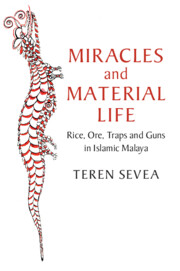Book contents
- Miracles and Material Life
- Asian Connections
- Miracles and Material Life
- Copyright page
- Dedication
- Contents
- Maps and Figures
- Prologue
- Acknowledgements
- Notes on Transliteration
- Abbreviations
- An Introduction
- 1 Compendia of Forest Patois and Agrarian ‘Ilmu
- 2 Pawangs and Munshis in Muhammad’s Ricefields
- 3 The Pawang’s ‘Wonderful Nose’ for Ore
- 4 An ‘Ilmu of Violence
- 5 Gun Gurus and Sufi Shooters
- Conclusion
- Glossary
- Bibliography
- Index
- Asian Connections
1 - Compendia of Forest Patois and Agrarian ‘Ilmu
Published online by Cambridge University Press: 26 June 2020
- Miracles and Material Life
- Asian Connections
- Miracles and Material Life
- Copyright page
- Dedication
- Contents
- Maps and Figures
- Prologue
- Acknowledgements
- Notes on Transliteration
- Abbreviations
- An Introduction
- 1 Compendia of Forest Patois and Agrarian ‘Ilmu
- 2 Pawangs and Munshis in Muhammad’s Ricefields
- 3 The Pawang’s ‘Wonderful Nose’ for Ore
- 4 An ‘Ilmu of Violence
- 5 Gun Gurus and Sufi Shooters
- Conclusion
- Glossary
- Bibliography
- Index
- Asian Connections
Summary
I chanced upon part of a Jawi epistle in the debris of a graveyard in Singapore in 2010. The epistle was believed to have been written by ‘Abdullah al-‘Aydarus, a descendant of a woman named Siti Maryam al-‘Aydarus (d. 1853). Siti Maryam was widely venerated as a patrilineal descendant of Muhammad (sayyida) and as one of the awliya’. She was also a pawang with a respectable Sufi pedigree; her living devotees debated if she had been a master (shaykha) of the ‘Alawi, Naqshbandi or Qadiri tariqas. Her shrine (Figure 1.1) was located in the centre of a Muslim burial ground of ‘ninety-nine graves’ in a riparian settlement, along the banks of one of the oldest harbours of Singapore. I first visited her shrine three weeks before it was scheduled to be demolished. There I met the shrine’s custodian (khadim, juru kunci) and resident bomoh, a Bugis man named Muhd. ibn Hasan. Amongst believers from Malaysia, Singapore, Indonesia, India, Pakistan and Hadramaut, Muhd. Hasan was more popularly known as Wak ‘Ali Janggut or the ‘Bearded ‘Ali’, which is the name I henceforth follow. Although Wak ‘Ali belonged to a relatively informal network of bomohs, he reported that he had competed with other bomohs regularly and been chosen by Siti Maryam to acquire the ‘ilmu of the pawang and her Sufi predecessors.
- Type
- Chapter
- Information
- Miracles and Material LifeRice, Ore, Traps and Guns in Islamic Malaya, pp. 42 - 77Publisher: Cambridge University PressPrint publication year: 2020



